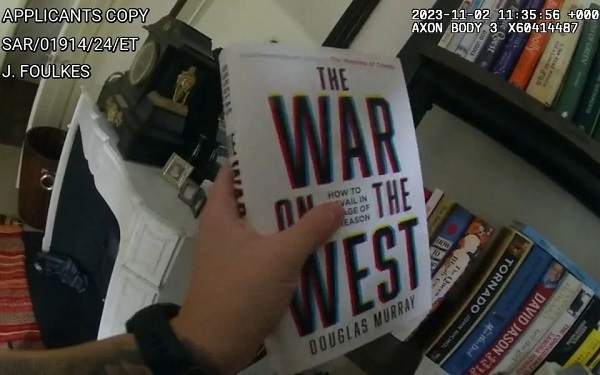It takes a very special kind of madness to send six baton-wielding, pepper-spray-toting police officers to arrest a 71-year-old man in his slippers. But here we are: welcome to Britain 2025, where tweeting the wrong opinion is treated with the same urgency as a hostage situation in Croydon.
Julian Foulkes, once a proud servant of law and order, now finds himself on the receiving end of what can only be described as a full-scale, Kafkaesque raid. His crime? Not drug-dealing, not fraud, not even refusing to pay the TV license. No, Julian questioned a pro-Palestinian demonstrator on X. Because apparently, free speech is now a limited-time offer.
The Curious Case of the Grocery List
The story began in Gillingham when Kent Police decided to deploy what must be half their annual budget to storm the Foulkes residence. Six officers with batons barged into the home of a pensioner who’s spent a decade in service to the very same force now treating him like the Unabomber.
And what high-level contraband did they uncover in this den of danger? Books. Literature. And not just any literature; “very Brexity things,” according to bodycam footage obtained by The Telegraph. One can only imagine the horror. Perhaps a Nigel Farage biography lying next to a battered copy of The Spectator. It’s practically a manifesto.
But wait, it gets better. A shopping list, penned by Julian’s wife (a hairdresser, no less), featured such ominous items as bleach, aluminum foil, and gloves. For those keeping score at home, that’s also the standard toolkit of anyone doing household chores or dyeing hair. But to Kent’s finest, it must have looked like the recipe for domestic terrorism. You half expect them to have called in MI5 to decipher the coded significance of “toilet paper x2.”
Now, this could all be darkly amusing if it weren’t also painfully cruel. While Kent’s squad of crime-fighting intellects were turning over Julian’s life like a garage sale, they rummaged through deeply personal mementos from his daughter’s funeral. Francesca, tragically killed by a drunk driver in Ibiza 15 years ago, had her memory poked through as if it were a bag of potato chips.
An officer was heard stating: “Ah. That’s sad,” before carrying on like she was flicking through junk mail.
After the shakedown came the cell. Eight hours locked up like a mob boss, while the state decided whether tweeting concern about a reported rise in antisemitism qualified as incitement or merely the audacity of having an opinion. It’s hard to say what’s more insulting; the arrest or the mind-numbing absurdity of it all.
A Nation Eating Its Own
Now, let’s not kid ourselves. This isn’t just a Kent problem. This is a snapshot of a country in full bureaucratic freefall. We’ve reached a point where police forces, rather than chasing burglars or catching knife-wielding lunatics, are now busy raiding the homes of retirees over innocuous social media posts.
Julian Foulkes is not a revolutionary. He’s not leading rallies, he’s not printing manifestos in his shed, and he’s certainly not strapping himself to the gates of Parliament. He’s a retired cop who owns a few books, uses X to vent the occasional opinion, and wants to visit his daughter in Australia without being flagged at passport control like he’s smuggling plutonium.
But after hours of interrogation for what the police grandly labeled malicious communication, Foulkes accepted a caution. Not because he believed he’d done anything wrong, he hadn’t, but because the alternative might have been even more grotesque. A criminal conviction. Which, for a man with family overseas, could turn his trips to Heathrow into a permanent no-fly zone.
“My life wouldn’t be worth living if I couldn’t see her. At the time, I believed a caution wouldn’t affect travel, but a conviction definitely would,” he said about being able to visit his daughter.
“That’s about the level of extremist I am… a few Douglas Murray books and some on Brexit.”
He reads. Possibly even thinks. The horror.

The Apology That Barely Was
Kent Police did what all institutions do when caught with their pants around their ankles. They mumbled something vaguely resembling an apology. They admitted the caution had been a mistake and removed it from his record.
And while that’s nice, it rather misses the point. Because they’d already sent a message, loud and clear: Think the wrong thing, tweet the wrong joke, and we might just pay you a visit. It’s the sort of behavior you’d expect in some authoritarian state where elections are won with 98 percent of the vote and the only available television channel is state news. Not the Home Counties.
Foulkes, for his part, hasn’t gone quietly.
“I saw Starmer in the White House telling Trump we’ve had [free speech] in the UK for a very long time, and I thought, ‘Yeah, right.’ We can see what’s really going on.”
He’s not wrong. For a nation so smug about its democratic values, Britain seems increasingly allergic to people expressing them.
He goes further, pulling no punches about the direction his former profession has taken.
“I’d never experienced anything like this” during his time on the force, he said, before diagnosing the whole debacle as a symptom of the “woke mind virus” infecting everything, including the police.
The Tweet That Triggered the Avalanche
The whole affair kicked off in the aftermath of the October 7 Hamas attack on Israel, a day of bloodshed that left 1,200 dead and more than 250 taken hostage. The shockwaves weren’t limited to the Middle East. They rattled through Europe, igniting a fresh wave of pro-Palestinian marches across the continent.
Foulkes, like many watching the news, saw a video of a mob in Dagestan storming an airport reportedly to find Jewish arrivals.
So, when he saw a post from an account called Mr Ethical; who, with all the irony the internet can muster, threatened legal action if branded an antisemite, Foulkes couldn’t help himself. He replied:
“One step away from storming Heathrow looking for Jewish arrivals….”

That was it. One tweet. One line. No threats. No calls to violence.
Foulkes maintains he’d never interacted with the account before. There was no feud, no history. His post had fewer than 30 views.
And yet, within days, he had six police officers treating his home like a crime scene.
What does this tell us? That we’ve entered an era where satire is indistinguishable from evidence. Where sarcasm is treated like sedition. And where a retired constable who’s paid his dues can still find himself pulled into the maw of state-sanctioned nonsense for a tweet.
So yes, the caution’s gone, wiped clean like it never happened. But the message is still smoldering in the ashtray: think twice before you speak, and maybe don’t speak at all if your bookshelf includes anything more provocative than a Gordon Ramsay cookbook. Because in modern Britain, it’s not always the rapists and murderers who get doorstepped, it’s pensioners with opinions. And if that’s where we’ve landed, then the only thing truly extreme is how far the country’s gone off the rails.

















